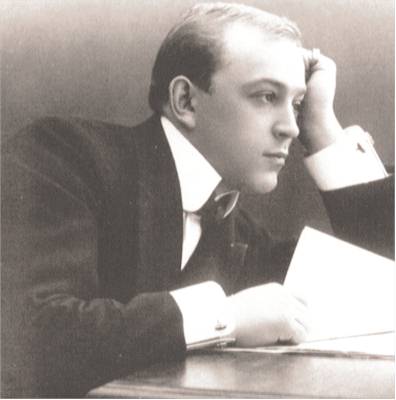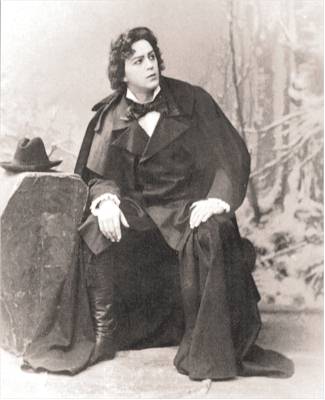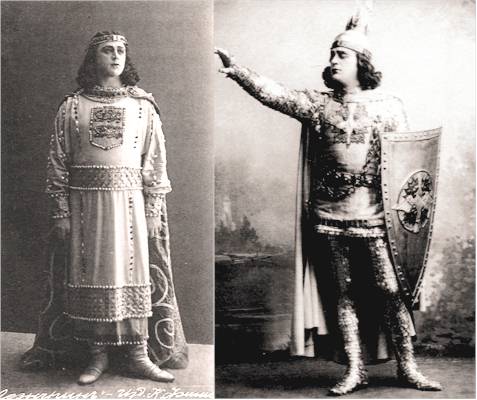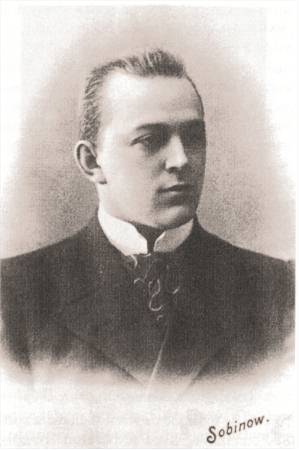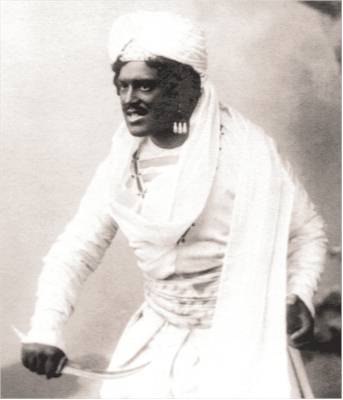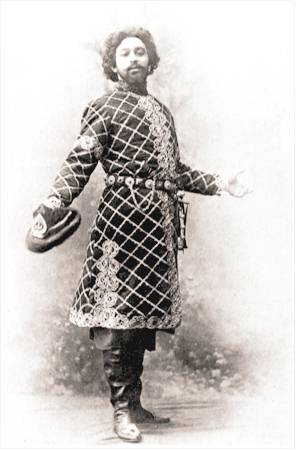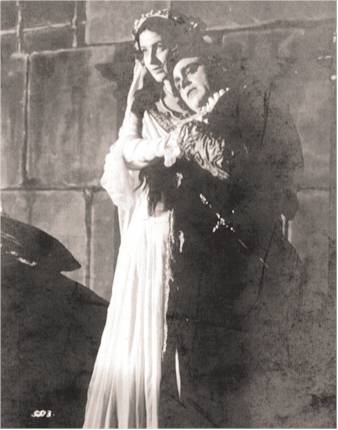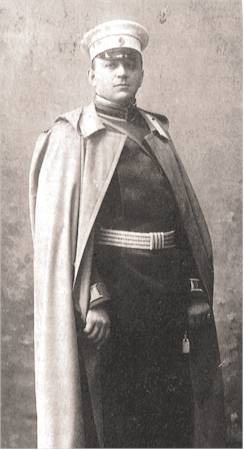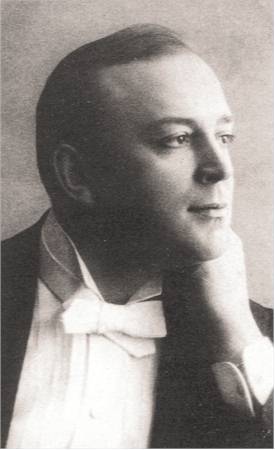Russian tenor, 1872 - 1934
Biographical notes: He was born in Jaroslavl in 1872, a town about 170 miles north-east of Moscow. His father was a sales representative in flour. His son did very well academically. Interest in music was satisfied by playing the guitar and singing in a local choir. After leaving school he enrolled in Moscow on a course leading to a degree in law. He completed the course in 1894, but by this time he made considerable expererience in a student choir. This included some appearances as its soloist. Nevertheless, his singing did not prevent his academic abilities. He obtained a law degree. After university came military service, compulsory at that time in Russia, and then he began to practice law. He studied with a tenor (Professor Dodonov) but he felt that this teacher was not suceeding in helping over certain problems. He took additional lessons from Alexandra Santagano Gorchakova. Sobinov still the law as his career. His teacher had other ideas and she made him go for an audition at the Bolshoi Theatre. This was in 1897 and brought him a two year contract! He soon was admired for his breath control, mezza-voce and enunciation. He appeared in operas such as Ruslan and Ludmila, Faust, Manon, Prince Igor, Eugene Onegin, Halka, Rigoletto, Tannhäuser (Walter von der Vogelweide) and in Ivanov’s Zabava Putyatishna. Sobinov was very much impressed by Feodor Chaliapin who was two years younger than him. They sang together in an opera in 1899. In the same year he added Andrej (Mazeppa), Gérald (Lakmé) and Germont to his repertoire. After going through the score of Don José he declined taxing the role too dramatic for his voice. The reigning star at the Bolshoi was Nikolai Figner but Sobinov was his equal in every way. To enlarge his repertoire (he added the tenor roles in Martha, Werther, Mignon and Roméo et Juliette) he decided to make several journeys to Italy to hear more of the Italian school.
As Lenski - a role he was made for... At the end of 1903 he sang an acclaimed Nadir in Les Pêcheurs des Perles opposite the great Antonina Nezhdanova . In 1904 he made his debut at La Scala as Ernesto (in Italian) receiving great praise from the critics. After a short time as a reservist in the army (Russian-Japanese war in 1905) he first appeared in Manon and Fra Diavolo. At the end of 1906 he sang in Monte Carlo. Lohengrin and Werther were the next roles. He appeared with triumphant success in Madrid and Berlin. His first Lohengrin at the Bolshoi was enthusiastically received, while in St Petersburg the critics compared him to the superb Ivan Ershov. Singing in London and Paris in 1909 he added Levko in Rimsky-Korsakov’s May Night and changed the role of Bayan to Finn in Ruslan and Ludmila. After many years of travelling he became a producer (1911). In 1912 he once more appeared at la Scala opposite Lucrezia Bori in Roméo et Juliette, conducted by Tullio Serafin. In the months before the outbreak of Worldwar I Sobinov appeared in a new role, Cavaradossi. Conscripted for military service again in 1914 his contract with the Imperial Opera lapsed. He was charged with organizing concerts for the wounded and for charity. The Revolution gave him a second chance of moving into management. Unlike other Russian artists like Chaliapin, Kuznetsova , Medtner, Rachmaninov and Davidov he elected to stay. When the Red Army gained control, he was given an administrative cultural post in Sevastopol. His last appearance in a concert was in 1921. In the same year he was appointed Director of the Bolshoi but after a view months he resigned to return to a life of opera and concerts. He died of a heart attack in 1934. He was decorated many times: Imperial Court Singer (1910), People’s Artist of the Union of Soviet Republics (1923), Officer of the Red Army (1925) and the Red Labour Banner (1933).
As Lohengrin
An early portrait (around 1901) “No Alfredo [Germont] before Sobinov, including the incomparable Giuseppe Anselmi
... had made me aware that Alfredo’s love is much a tragedy for him as it is for Violetta... Sobinov was the first singer to make me pity him as well.”
“ He was a hard worker. He was very demanding in his attitude to the text.” Sergej Levik, tenor
As Nadir in Bizet’s “Les Pêcheurs des Perles”
As the Prince in Dargomizhsky’s “Rusalka”
Maria Kuznetsova and Leonid Sobinov in Boito’s “Mefistofele” Comment:
Leonid Sobinov was certainly among the first significant artists to be recorded. Symposium released many of his superb recordings. The 1901/1904 recordings are in very good sound!
Sobinov’s recorded repertoire reflects the roles in which he was appearing. André Kamienski wrote: “The voice is obviously of exceptionally fine quality, beautifully
schooled, totally suited to lyric parts, and instantly recognizable. There is nothing to indicate his abilities in florid music; bar one attempted trill or shake. This starts with apparent excellence
but, expectations are disappointed as it soon peters out. It could be suggested that there is a degree of uniformity in his singing, even of monotony. There may be some element of truth in
this, but, equally, such a feeling might be engendered by a singer who sings flawlessly, who sings with complete fidelity to the score, who lacks unfortunate vocal mannerisms, and does not seek
“improve” the music with needless or tasteless embellishment.”
Leonid Sobinov in lieutenant’s uniform (1905) “I tell you in private, I feel very stupid in uniform. I feel a complete idiot... there’s not a lot of sense in all this.”
Portrait
(around 1910) Dmitri Sintsov wrote: Maybe you would be kind to add a link to the Memorial House-Museum of Leonid Sobinov site which is located at: http://www.sobinov.yar.ru and is available in three languages: Russian, German, and English.
The site is non-commercial and it's not advertizing (I do not get paid for this), but because the specialists from the Sobinov museum were looking for additional information about the life of
Sobinov's son (Boris) in Germany, perhaps someone would get in touch with them. “In 1945 he [Boris Sobinov] was stolen from Berlin American Zone by NKVD and was condemned
to 10 years prison in USSR. He was liberated in 1955 and died in 1956. The Memorial Museum keeps safety his comb, eye-glasses and spectacle case. Nina and Svetlana Sobinov presented his
musical notes which were created in German in 1920-1930. This music is unknown to Russian auditorium because his works hasn't been performed here yet. This is still approaching. The name
of Boris Sobinov is another name of a talented composer who would be opened to people. His music was performed in Finland, Poland, France, and Germany where the musical notes and other documents could survive.” We would appreciate any information about the little known emigration period of life of Boris Sobinov. You can contact us at “Das glänzende Leben von Leonid Sobinow als "Liebling des Publikums" ist noch ein
Sowjetmythos. Die Revolution zerstörte das Leben des riesengrossen Landes, sie mischte sich auch ins Leben der Familie Sobinow. Erst heute erfahren wir dramatische Lebensumstände von
Leonid Sobinow und seinen Familienangehörigen. Im Lebenslauf des Sängers und in der Geschichte seiner Familie bleiben bis heute unbekannte Seiten.”
Wir würden uns sehr freuen, wenn wir von unseren Kollegen, von Fachleuten und Amateuren, die sich mit der Geschichte der russischen Musikkunst Ende vom 19. bis Anfang des 20.
Jahrhunderts beschäftigen und sich für das Schicksal von L. Sobinow interessieren, für uns nötige Informationen liefern könnten. Schicken Sie bitte ein email an
|
||||||||||||||||||||||||||||||||||||||
